Occupy Central
Occupy Central is a civil disobedience movement which began in Hong Kong on September 28, 2014. It calls on thousands of protesters to block roads and paralyse Hong Kong's financial district if the Beijing and Hong Kong governments do not agree to implement universal suffrage for the chief executive election in 2017 and the Legislative Council elections in 2020 according to "international standards." The movement was initiated by Benny Tai Yiu-ting (戴耀廷), an associate professor of law at the University of Hong Kong, in January 2013.
Umbrella Movement
The Umbrella Movement (Chinese: 雨傘運動; pinyin: yǔsǎn yùndòng[1]) is a loose political movement that was created spontaneously during the Hong Kong protests of 2014.[2] Its name derives from the recognition of the umbrella as a symbol of defiance and resistance against the Hong Kong government, and the united grass-roots objection to the decision of the Standing Committee of the National People's Congress (NPCSC) of 31 August.
The movement consists of individuals numbering in the tens of thousands who participated in the protests that began on 28 September 2014, although Scholarism, the Hong Kong Federation of Students, Occupy Central with Love and Peace, groups are principally driving the demands for the rescission of the NPCSC decision.
The movement consists of individuals numbering in the tens of thousands who participated in the protests that began on 28 September 2014, although Scholarism, the Hong Kong Federation of Students, Occupy Central with Love and Peace, groups are principally driving the demands for the rescission of the NPCSC decision.
OCCUPY CENTRAL - DAY 68: Full coverage of the day’s events
Loss of confidence a hazard of occupation
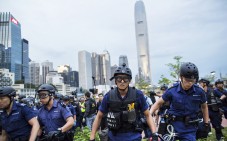
The early days of the Occupy Central movement had little impact on the Hong Kong economy. Twenty-nine per cent of our economy is finance – most of that globally related – and 25 per cent is trading and logistics, a legacy from our centuries old entrepôt status with China.
Top US official urges Beijing to grant Hong Kong ‘meaningful choice’ in elections
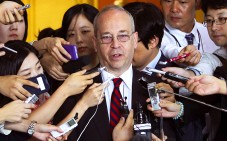
Daniel Russel has urged Beijing to give Hong Kong a “meaningful choice” of election candidates and expressed concern central government’s commitment to maintaining city’s autonomy is eroding.
Punish surrendering Occupy protesters leniently, Hong Kong top court judge urges
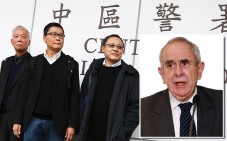
A non-permanent judge of the city’s top court says Occupy protesters who have turned themselves in to police should be punished leniently.
Occupy protesters in Mong Kok take to the 'shopping tour'
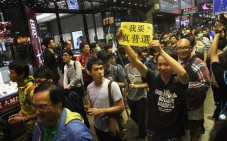
Traffic may have returned to the Mong Kok protest zone, but last week's clearance of the encampment has given rise to a new form of protest known as the "shopping tour".
Mainland Chinese youth remain cool to Hong Kong's democracy fever
Yun Tang says economic growth and rising nationalism are key factors
Hong Kong is still smouldering from the fire of the Occupy protests, the largest in China since the Tiananmen Square crackdown of 1989. But the flames haven't spread to the mainland. While many believe it is the result of the central government's efforts to censor the news, that hasn't played a decisive role.
After the Hong Kong unrest erupted in late September, China's state media were briefly gagged. Soon, though, they were firing salvos of criticism at the protesters.
Besides, China's internet firewall is porous, so it is virtually impossible to block news of such magnitude. There are many tools available to get round attempts at censorship.
Instead, China's continuing economic stability is the primary reason mainlanders are seemingly unconcerned with the Hong Kong protests. The country's rapid economic progress has brought wealth and comfort, as well as a fear and loathing of politics.
For their part, the Hong Kong protesters simply want their grievances to be heard by Beijing. They have no desire for their protests to spill over to the mainland. Thus, the protests have neither appealed to nor affected the lives of those across the border.
Another factor is the ongoing anti-corruption campaign launched by President Xi Jinping , which has helped to pacify the rising tide of public indignation. Unprecedented in scale, the campaign is shaking up the whole ruling class. The average citizen is happy to see the anti-corruption measures limit the privileges of officials. In a traditionally "official takes all" society, one campaign cannot root out all corruption but, in this case, it has defused the social tensions that otherwise could have flared up over the Hong Kong protests.
Furthermore, the younger generation is not seeking a Hong Kong-style rebellion. Today's college students are too young to remember Tiananmen. For Chinese citizens under 30, their will to challenge the authorities has been severely curtailed by the daily burdens of life, such as finding job opportunities and housing.
In addition, the crass commercialism the younger generation is exposed to makes them self-centered, and encourages them to worship money while remaining politically apathetic.
The silence of the mainland's masses can also be attributed to an outburst of nationalist sentiment over the chaos in Hong Kong. On China's vibrant social media, the overwhelming tone of the discussions has been against the protests. The usually cynical netizens firmly believe Beijing's assertion that the upheaval was fomented by outside forces. Obviously, Beijing's rising global clout fuels nationalism.
China is now economically united with the outside world, but its political development follows its own path. In recent years, Beijing has successfully averted any potential fallout from political shock waves such as the Arab spring of 2011 and the Hong Kong protests. Neither has disturbed China's overall stability.
Nevertheless, the government still has to handle daily protests across the country involving social disputes and remains extremely vigilant against political mobilisation. Above all, the disturbance the government fears most is economic stagnation.
China's growth has been slowing, reflecting policy efforts to rebalance the economy. Nevertheless, according to the World Bank, the average growth of the world's second-largest economy is expected to be slightly above 7 per cent for 2015-16, still robust enough to move society forward. But it is becoming more and more challenging for the ruling elite to keep China free from political turmoil as citizens' consciousness of and desire for democracy and freedom of information awakens.
Yun Tang is a commentator in Washington. tangletters@gmail.com
This article appeared in the South China Morning Post print edition as Mainland youth remain cool to HK's democracy fever
Hong Kong student federation to consider a retreat from Occupy zones within a week
The Federation of Students, the major force behind the Occupy Central protests, could decide within a week whether to retreat from occupied sites after refusing for more than nine weeks to call off its civil disobedience action.
A change of mind at the core of the federation seems to be afoot after its chief admitted an escalation in their protests on Sunday, when the government headquarters was besieged, had failed.
But the other Occupy student group, Scholarism, appears to be pressing on. Two new hunger strikers joined three others as one of them, group convenor Joshua Wong Chi-fung, drank a teaspoon of glucose on doctors' orders. This happened after his blood sugar dropped worryingly.
Watch: Hong Kong Occupy protests student leaders consider retreat
A core member of the federation, Yvonne Leung Lai-kwok, said protesters had to consider how to conserve their energy so they could stay the course in pursuit of democracy.
"Some protesters [in Admiralty and Causeway Bay] have expressed their intention to remain until police clear the sites, but we also need to think clearly about why we are continuing the occupation," Leung told Commercial Radio yesterday. "It is clear that a concrete decision would be needed [and] this could be made within a week."
On Wednesday, the federation's secretary general, Alex Chow Yong-kang, floated the idea of shifting their focus beyond the sit-in zones to the community.
At the Admiralty site, Scholarism hunger strikers appealed to pro-establishment lawmakers to help resume dialogue with the government.
"The focus of the dialogue will be restarting the five steps of constitutional reform," Cheng Yik-lam said. "This is not against the Basic Law."
The Chief Executive's Office has said Scholarism's request will not be accepted.
Meanwhile, doctors gave Wong, 18, some glucose after his blood sugar dipped to 2.7 millimoles per litre during a 10.30am check-up.
Normal blood sugar levels hover around 5 to 6 mmol/l before meals. A glucose solution is recommended to those whose levels drop below 3 mmol/l.
The teenage activist, who started fasting at 10pm on Monday, apologised for not sticking to his self-imposed rules. "I'm supposed to only drink water."
Two more Scholarism members - Polytechnic University student Eddie Ng Man-hin, 20, and Chinese University student Gloria Cheng Yik-lam, 20 - joined the hunger strike.
At the Legislative Council, lawmakers debated police enforcement of court orders to clear Mong Kok occupiers.
The Civic Party's Dennis Kwok, lawmaker for the legal sector, said: "Police have made use of the injunctions as an excuse to clear areas outside the scope of the court orders."
Secretary for Security Lai Tung-kwok said the police had been restrained and had employed only minimal force.
Bus operator All China Express, which has received court approval to remove blockades in Admiralty, would discuss with bailiffs and the police on Tuesday how to execute the injunction, the company's lawyer Paul Tse Wai-chun said.
Additional reporting by Elizabeth Cheung
This article appeared in the South China Morning Post print edition as Student federation to ponder a retreat within a week
PUBLISHED : Thursday, 04 December, 2014, 6:03pm
UPDATED : Thursday, 04 December, 2014, 7:29pm
Police must be held accountable for abuses during protest clearance
Albert Cheng calls for an independent inquiry to be set up amid mounting claims of serious assault and wrongdoing by individual officers
The students have admitted that their latest attempt to escalate the protests at Admiralty was a failure. It ended in the most serious confrontation with the police since September 28, when 87 tear gas canisters were launched at the crowds.
Chief Executive Leung Chun-ying spared no time in scoring some political points. He said the police had been tolerant over the past two months and warned the activists not to take the police forbearance as a sign of weakness.
"If this can be tolerated, what cannot be?" he said, citing a Chinese idiom.
Leung was quoting one part of
The
Analects, in which Confucius admonished the Ji clan for presenting eight rows of dancers in a ceremonial dance, which was the prerogative of the emperor according to the social and political hierarchy of the day.
The
Analects, in which Confucius admonished the Ji clan for presenting eight rows of dancers in a ceremonial dance, which was the prerogative of the emperor according to the social and political hierarchy of the day.
Leung's choice of metaphor reflects his paternalistic mentality. In his eyes, the umbrella movement boils down to a disrespectful challenge of the authorities.
The way he has condoned the police's excessive use of force to restore order is staggering.
Anyone who bothers to look at the videos and messages on social media will find that some police officers had behaved improperly in dealing with the Occupy protesters.
First of all, the police were selective in their enforcement of the law. They used double standards in dealing with protesters and triad gangsters in the occupied sites. On October 2 and 3, in particular, the police allowed triad ringleaders to intimidate protesters.
In addition, officers have beaten up protesters already subdued and under arrest. Such abuse of power may well amount to a criminal offence. The two cases captured on video - one of which involved seven officers who have now been arrested - are likely to only be the tip of the iceberg.
Student leader Joshua Wong Chi-fung, for one, claimed he was assaulted by police when he was arrested late last month. His lawyer told CNN he was kicked and punched and "effectively sexually assaulted".
If this were true, and this indeed happened to an icon of the democracy campaign, imagine how the average protester would have been treated. The police owe the public an explanation of what happened.
There have also been several allegations of police officers provoking members of the public, including with racial and sexual taunts.
In one video, a group of officers was seen taunting protesters who had retreated to an MTR entrance at Admiralty. One officer was seen flashing the middle finger while the others called the young protesters "rubbish". This was a clear violation of the police code of conduct.
Labour Party lawmaker Fernando Cheung Chiu-hung, who is known to have a mentally disabled daughter, said he was verbally abused by police while observing the situation in Mong Kok. "I nodded to an officer, but he said, 'Don't you nod to me. Go home and take care of your daughter, she's sick'," Cheung said.
This was clearly a breach of the Disability Discrimination Ordinance.
The police even allegedly targeted medical volunteers - some claimed they were roughed up by officers while attending to the injured in Admiralty.
In a way, the police are themselves a victim of the circumstances. They are trapped in an unenviable, prolonged state of hypertension.
Instead of coming up with a political solution to the Occupy protests, Leung has exploited the police force as an instrument for bolstering his unpopular rule. No wonder Leung has turned a blind eye to the misbehaviour and illegal acts of individual law enforcers.
The Independent Police Complaints Council has been flooded with over 1,700 Occupy-related complaints. The council, however, is dominated by members who are supporters of Leung and has little credibility. It remains to be seen how long it will take to handle these files.
Meanwhile, new pieces of evidence of police abuse emerge almost every day.
Frustrated by the government's inaction, Scholarism has mounted an online petition to urge the United Nations Human Rights Council to launch an inquiry into "Hong Kong police and government human rights abuses". The students initially set their target at 25,000 signatures. Over 85,000 have signed so far.
The UN petition is, of course, a long shot. Allegations against the police are so numerous and serious that it warrants an independent investigation, led by a judge.
It has nothing to do with the political struggle between the yellow-ribbon and blue-ribbon camps. This issue is more fundamental. We need to stop Hong Kong from degenerating into a police state before it is too late.
Albert Cheng King-hon is a political commentator.taipan@albertcheng.hk
This article appeared in the South China Morning Post print edition as Police must be held accountable for any abuses during protest clearance
Hong Kong group, including medical volunteers, calls for probe into police violence in Admiralty and Mong Kok
PUBLISHED : Thursday, 04 December, 2014, 12:50am
A group of concerned residents has condemned the police action against Occupy protesters in Admiralty earlier this week and urged the Independent Police Complaints Council (IPCC) to launch a probe. They also called on Police Commissioner Andy Tsang Wai-hung to apologise.
"It was like [the police] were acting in a red haze of violence," said Dr Au Yiu-kai, who is a veteran international relief doctor and the volunteer head of medical services for the "umbrella movement".
"In Mong Kok, injuries happened on the front line. I don't condone violence, but the situation was understandable. What happened on Lung Wo Road was different - police continued to beat up retreating people," said Au. "This was completely outrageous."
Au and a group of parents, clergy and academics joined forces in condemning what they called the excessive and unnecessary use of force by the police during clearance operations in Admiralty and Mong Kok.
The group collected over 5,000 signatures for a letter to the police, demanding that the IPCC thoroughly investigate the use of violence in the two places and for the report to be released to the public. They also called on the police chief to apologise.
Au said he was chased from Lung Wo Road to Tamar Park while trying to staunch a protester's bleeding head on Monday morning. He said he had started to bandage the wound when a group of officers came at them. One hit the protester's injured head with a baton, he said.
"I shouted that I was a doctor and they could see I was doing medical work. Another police officer yelled: 'I don't care if you're saving lives, I will still arrest you'. Luckily other protesters were around and dragged me away," Au said.
At least 16 medical personnel and 33 emergency volunteers were injured, including one who was beaten over the head with a baton, he said.
The IPCC said yesterday that it would not send observers to inspect Occupy protest zones. "It will be the individual choice of committee members if they want to make on-site observations," said IPCC secretary general Ricky Chu Man-kin. "As far as the IPCC as a statutory body is concerned, we need to maintain our impartiality," he said.
More than 1,700 complaints related to the Occupy movement have been filed against the police since protests started in late September.
Meanwhile, Alliance for Peace and Democracy spokesman Robert Chow Yung said police had exercised necessary but not excessive force to stop protesters.
"They have done a great job to protect Hong Kong and the Hong Kong public," he said yesterday, during a rally to express thanks to the force outside police headquarters in Wan Chai.
This article appeared in the South China Morning Post print edition as Call for probe into police violence
Police manual encourages officers to think twice, at least, before action
PUBLISHED : Thursday, 04 December, 2014, 12:50am
The police force ensures its officers go through a "thinking process" when assessing the need to make an arrest, in line with a revision of its procedures early this year, a legal observer says.
Amendments to the Force Procedures Manual also gave officers a clearer idea of when to arrest people, Eric Cheung Tat-ming, a legal scholar with the University of Hong Kong, said.
Cheung cited the manual, which the force reviewed following advice from a police watchdog a few years ago, as 62 people who followed three Occupy Central founders to surrender themselves to police yesterday were allowed to leave without being arrested or charged. Students did not seem to be among the group who visited the Central police station in Sheung Wan.
Cheung, who also sits on the watchdog, the Independent Police Complaints Council, said the revised manual placed emphasis on the necessity of arrest action at a particular point in time.
"Officers now are required to explain in writing why immediate arrests are necessary," he said. "The idea is to make sure it involves a thinking process."
In anticipation of the mass surrenders yesterday, the force had drafted a custom-made form to save time in processing the cases, a police source said.
The form listed seven charges that those people were likely to admit, ranging from light offences such as taking part in an unauthorised assembly, to criminal damage and assaulting a police officer, the source said.
They also had the option to declare any other offences they thought they had committed.
They did not need to sign the form as it was for record-keeping purposes, the source said.
Cheung believed the form existed solely to streamline the process in case hundreds showed up, since mass surrenders would stall any police service.
On why no one was arrested yesterday, he said: "Reasonable suspicion is only the minimum condition [for making arrests]."
The Occupy protesters that turned themselves in said their acts were to show they would bear the legal consequences of civil disobedience.
They expressed hope that more would do the same soon.
As he left the police station, Cardinal Joseph Zen Ze-kiun said: "The concept behind us surrendering is to end the movement." He urged student protesters to discuss what they should do next.
Outspoken teacher Ng Mei-lan, who held a placard in 2010 demanding universal suffrage during then chief secretary Henry Tang Ying-yen's visit to her school, said: "It's not a problem [even if I lose my teaching licence]. I am prepared for the worst-case scenario."
But pastor Angus Ip, who was also among the group, said the act of surrendering should have come earlier. "The public's views [of Occupy] have changed."
This article appeared in the South China Morning Post print edition as Revised manual encourages officers to think twice
Officials to speed up clearance of protest sites after Admiralty clashes, source says
PUBLISHED : Thursday, 04 December, 2014, 12:50am
Police clear pro-democracy protesters from Lung Wo Road. Photo: EPA
The government has decided to speed up the clearance of protest sites in the wake of violent clashes between police and activists who laid siege to the government's headquarters in Admiralty on Sunday and Monday.
This marks a departure from its previous stance of waiting for the protests to die down.
A government source said the administration was wary of growing security risks after the overnight clash, during which protesters wearing hard hats and masks charged police lines after student groups called on them to surround the government offices.
"Student leaders have not paid heed to advice from Occupy Central leaders and community leaders across the political spectrum. It's unrealistic to expect students to retreat from protest sites on their own initiative," the source said.
Student leaders believe it would be inappropriate to disperse the crowds before the government makes any concession on Beijing's strict framework for the 2017 chief executive election.
They have also ruled out turning themselves in to police.
The source said police would clear protest zones in Admiralty and Causeway Bay in the "near future", adding that the exact time would be decided by police based on operational needs.
The government has adopted a wait-and-see strategy since the occupation campaign began on September 28, hoping that anger from people affected by the sit-ins would wear down protesters.
A source close to pan-democrat lawmakers said that during their breakfast meeting last Thursday with Chief Secretary Carrie Lam Cheng Yuet-ngor she "gave no timetable" for clearing the protest sites in Admiralty and Causeway Bay, hinting the government would rather wait for the protests to fizzle out.
On Monday, a High Court judge granted cross-border bus company All China Express an interim injunction to clear a section from Connaught Road to Cotton Tree Drive in the Admiralty-Central protest area.
"The timing of the police's clearance action in Admiralty won't rely on when the interim injunction order is enforced as police are empowered to take action under other ordinances," the source said.
This article appeared in the South China Morning Post print edition as Violence 'to spur action on clearing protest sites'
PUBLISHED : Thursday, 04 December, 2014, 3:31am
UPDATED : Thursday, 04 December, 2014, 3:31am
Talking past each other on injustice in Hong Kong
Some people argue breaking the law as an act of civil disobedience, such as what legal scholar Benny Tai Yiu-ting has advocated, undermines the rule of law. Others say that's nonsense: if the law or the system itself is unjust, challenging it becomes a moral duty. To challenge an unjust law or system amounts to upholding justice and the rule of law.
The people who support the former stance are usually the conservative pro-establishment types, while those who support the latter are often pro-Occupy or pro-democracy. As a principle, I believe in the moral duty argument, which is what Tai and his pan-democratic allies have been arguing to justify mass protests and resistance.
Where I differ from them is whether their total resistance, rejection and opposition is proportionate to the levels of injustice that actually exist in our society (a socio-economic problem) and in our political system (a government problem). When we talk about the rule of law and justice, we often conflate all these issues, so we are effectively talking past each other.
Tai has repeatedly cited "injustice" as the reason for the need to take action. He has described "injustice in society", "injustice in the law and the legal system" and most recently this week, "an unjust system", which presumably refers to our political system, which above all, does not allow what pan-democrats call "genuine universal suffrage". For Tai, we clearly suffer injustice with a capital I. Others, including some government and pro-Beijing figures, tacitly acknowledge smaller injustices such as the wealth gap, business dominance, poor governance and lack of opportunity and upward mobility for young people.
All social and political systems contain some injustice and unfairness because they are all imperfect. Some systems evolve and self-correct. Others are so unfair, unjust and oppressive that almost any type of resistance, including violent overthrow, would seem justified. There is injustice with a capital I and injustices with a small i. We are all biased. But as responsible citizens, we should at least try to reason with ourselves whether our response should be acceptance, reform or rejection of our socio-political systems. Fighting an injustice sometimes results in worse injustices.
This article appeared in the South China Morning Post print edition as Talking past each other on injustice
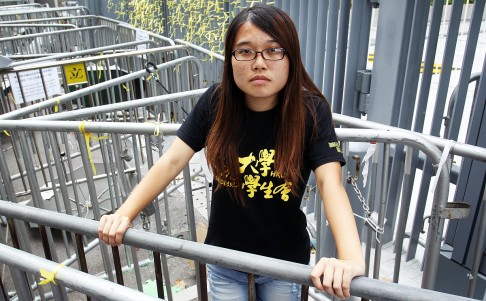

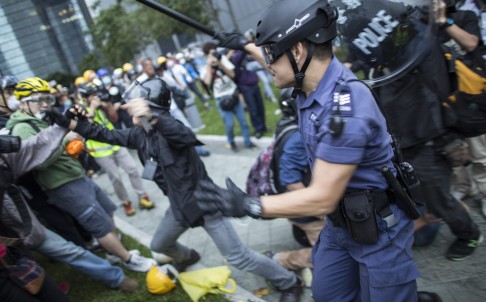

沒有留言:
張貼留言